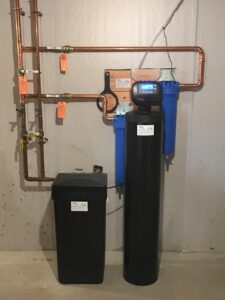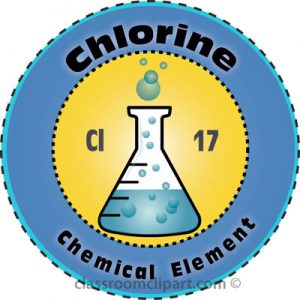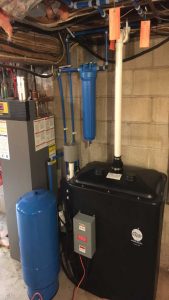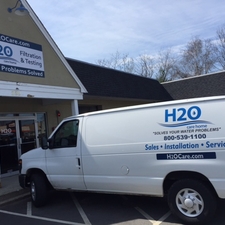Newburyport, Massachusetts residents may want a water softener or some other type of water filtration system to improve water quality. There are proven methods to remove contaminants and provide you with excellent water quality. Prior to considering a water filtration or water softener system, water testing should be conducted and results analyzed. For more on water testing, see the link at http://water-testing/.
See 90 second video below:
IRON, MANGANESE, LOW pH, ARSENIC & RADON

High Efficiency Water Softener
Common issues encountered in Wayland private wells are hard water, manganese and iron. Additionally, low pH and sometimes the health threats radon and arsenic have been found in water. If the testing results for radon exceed the current Massachusetts guideline of 10,000 pCi/L in water, the radon must be removed. Additionally, it is recommended to the radon in air as well in such case. It should be noted that New Hampshire requires action if radon is 2,000 pCi/L (pico curries per liter). Also, Maine and Rhode Island are at 4,000 pCi/L. Additionally, the EPA maximum allowable level of Arsenic in drinking water is 10 parts per billion. For more information on this see the link at Mass DEP Arsenic Info.
BAD ODORS & TASTES IN YOUR WATER 
There are various types of bad odors and tastes that you may experience in your water. Hydrogen Sulfide is not uncommon and is evidenced typically by a rotten egg smell in your water, however this may also be caused by high Manganese levels as well. A water filtration specifically for this problem is effective in correcting this. For a more complete description of this and other potential bad odors and taste in your water, see the link at http://bad-odor-taste-water/.
WATER FILTRATION & WATER SOFTENING SYSTEMS
Water softeners are typically installed to remove dissolved iron or manganese in the water through a technology called Ion Exchange, while particulate iron and manganese is removed with sediment filtration. Arsenic is removed with tanks containing a specific media that “grabs” the arsenic out of the water. Removing radon from water requires a system where the water is agitated and contained, but then properly vented, sending the radon gas outside the home to ambient air (See photo below). Other technologies and systems are used to remove the other contaminants.

Radon in Water Removal
H2O Care is an established full service water filtration and testing organization, originally formed in 1989, with offices in Stow, Middleton & Lakeville, MA. See our published articles in Water Technology Magazines at http://publications. Reach us at service@h2ocare.com or by calling us at 978-777-8330.
H2o Care, Inc. is an established, full service water testing and filtration systems installation and service organization formed in 1989, based in Middleton, MA off route 114, with additional offices in Stow & Lakeville, MA. The company has been published in Water Technology Magazines, see H2o publications. Reach us at service@h2ocare or 978-777-8330.



